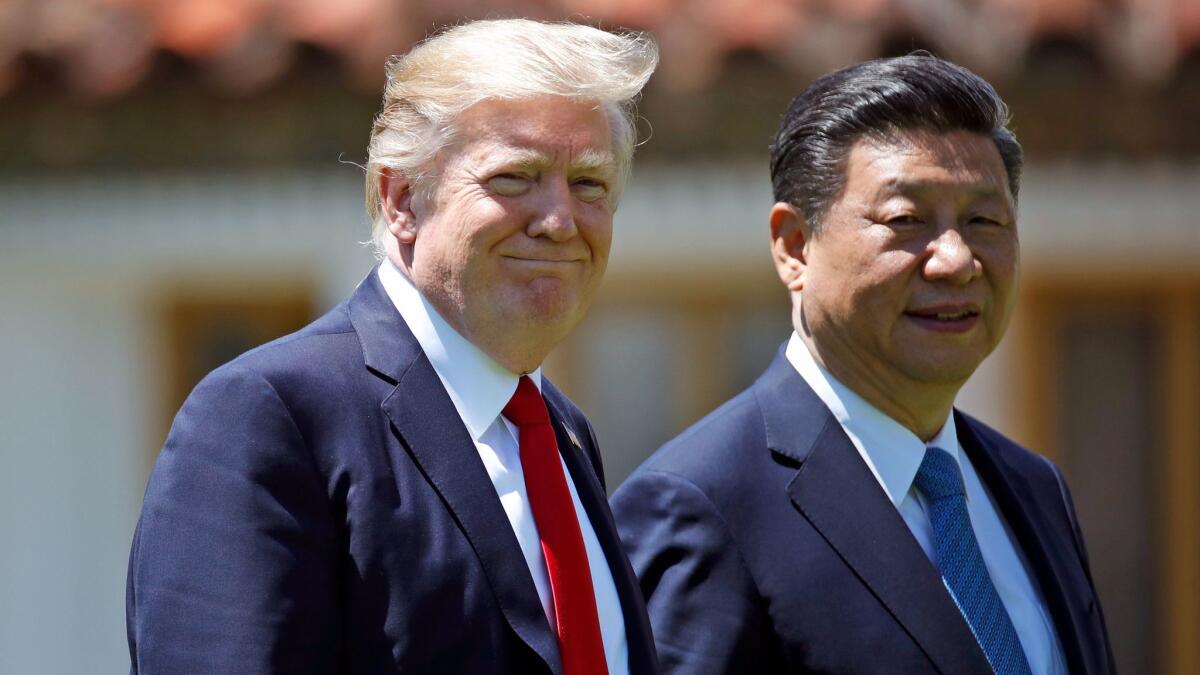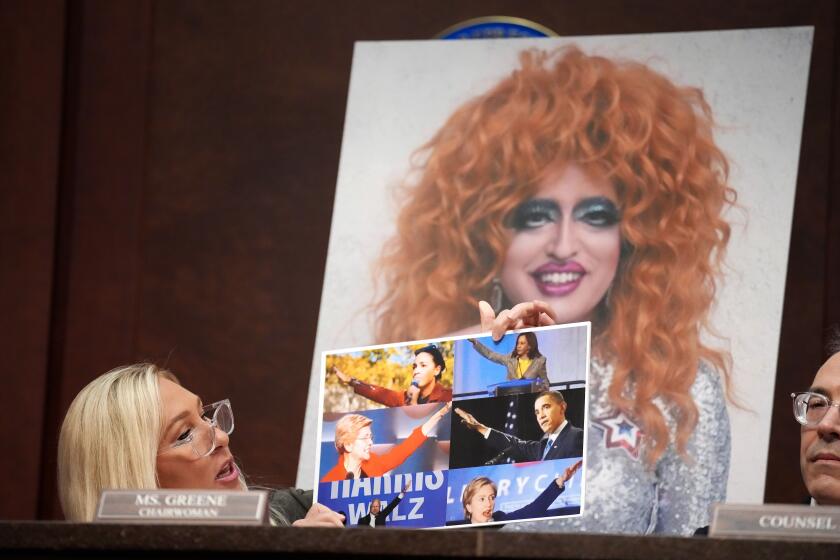Trump likely to slap limited sanctions on China over Hong Kong crackdown

- Share via
WASHINGTON — Under political pressure to take a hard line against China for its crackdown on Hong Kong, President Trump instead is planning to impose relatively mild new sanctions on visas and Chinese access to the global financial system.
The president wants to cool the growing confrontation between the world’s two most economically powerful nations, in part to salvage their trade deal and his personal relationship with Chinese President Xi Jinping, according to some supporters, including Stephen K. Bannon, the former senior White House strategist. But to a large extent, the moderate response reflects just how little leverage the United States has over China.
“Beijing holds all of the cards in this dispute and has made it quite clear that it is willing to take actions that will harm the well-being of Hong Kong in order to protect national security as the Chinese Communist Party defines it,” said Robert Daly, a China-U.S. relations expert at the Wilson Center.
“That is the fundamental decision that has already been taken. And because Hong Kong is fully a part of the PRC, there’s not much the United States can do to change its mind,” he said, using the abbreviation for the People’s Republic of China.
This week, Trump vowed to respond “very powerfully” to what’s widely regarded as Beijing’s significant abridgment of Hong Kong’s autonomy and personal freedom, which is greater than what exists on the mainland. But such action would also probably cause considerable financial harm to the Hong Kong economy and its people.
“The U.S. will do what we can and thread that needle as best we can,” said David Stilwell, assistant secretary of State for East Asian and Pacific affairs.
Trump could have chosen to strike a more powerful blow, as some of his more nationalistic supporters urged: curtailing the special financial and trade privileges that Hong Kong enjoys in the global marketplace, with support from the United States. Those privileges have been extremely valuable to Beijing, providing it with financial benefits that China would not enjoy as a more closed and less-transparent economy.
Trump’s decision to avoid tougher action was seen as shaped in part by election-year politics. Even as the president’s campaign is depicting his Democratic rival Joe Biden as soft on China, Trump is eager to protect the new trade deal in which China has promised to buy huge quantities of U.S. products, especially from struggling American farmers who have been among his strongest supporters.
A harsher U.S. response would probably lead Beijing to cancel the deal. Even before this showdown, many analysts considered that China was unlikely to live up to its trade commitments.
As expected, China’s rubber-stamp parliament on Thursday approved legislation expanding the central government’s power to crack down on protests and other activities in Hong Kong.
A day earlier, anticipating the Chinese parliament’s action, Secretary of State Michael R. Pompeo told Congress that Hong Kong was no longer sufficiently autonomous from China — a statement seen as a precursor to U.S. sanctions.
“No reasonable person can assert today that Hong Kong maintains a high degree of autonomy from China, given facts on the ground,” Pompeo said.
“This decision gives me no pleasure,” he added. ”But sound policymaking requires a recognition of reality. While the United States once hoped that free and prosperous Hong Kong would provide a model for authoritarian China, it is now clear that China is modeling Hong Kong after itself.”
That signaled a major shift in U.S. policy and cleared the way for Trump to end some or all of the economic and trade preferences accorded Hong Kong after Britain’s handover of the territory to China in 1997.
In the agreement under which Britain surrendered its colonial control over Hong Kong, Beijing agreed to permit an independent judiciary, press freedoms and other civil liberties for 50 years. Until the colonial era, Hong Kong had always been considered a part of China.
“The president’s trying to do a graduated response,” said Bannon, who has been a sharp critic of the Chinese Communist Party leadership.
“I don’t think that’s correct, but he’s getting pressure from a lot of different parties. And he believes strongly he’s got a relationship with Xi,” Bannon said, referring to Trump’s claims of friendship with China’s authoritarian leader.
Protests over its encroachment on Hong Kong’s special freedoms have apparently stiffened Beijing’s determination to end the Chinese territory’s semiautonomous status, no matter what the reaction is in Washington or other world capitals.
Faced with that, Trump administration officials were noticeably torn about what to do. While they wanted to go well beyond mere condemnation or symbolic actions that Beijing could easily ignore, taking strong measures to curtail Hong Kong’s role as a financial hub would hurt the territory and its population of 7.5 million, as well as the nearly 2,000 American firms operating there.
“Our approach is to mitigate the impact globally on the Hong Kong people while at the same time helping Beijing understand our concerns,” said Stilwell, the assistant secretary of State.
“But as we talk about this, we need to talk about the actor in this case, and that’s the PRC who is changing the status quo,” he said.
Revoking Hong Kong’s special economic and trading status with the United States, which Congress guaranteed would continue after Britain’s handover if Hong Kong remained autonomous, was considered the “nuclear option.” An autonomous Hong Kong has been a base for China’s top companies and political elite to get access to international capital, export goods more advantageously and make investments.
The U.S. treats Hong Kong as a separate customs district, and goods shipped from there are not subject to U.S. tariffs on exports from mainland China. Nor does Hong Kong face the export controls on sensitive technologies that apply to the mainland.
At the same time, the territory’s relative importance to China’s economy has diminished over the years. And international businesses could flee to other parts of Asia and even back into the mainland.
“It’d be a Pyrrhic victory,” said Jude Blanchette, a China scholar at the Center for Strategic and International Studies, as the brunt of the pain from much tougher U.S. actions would be felt by the Hong Kong people.
Britain, which joined the United States, Canada and Australia in expressing deep concern over Beijing’s move on Hong Kong, said it would offer Hong Kong residents with British passports greater visa rights and a pathway to British citizenship if China imposes the new security law.
Trump’s response is expected to leave intact the U.S.-China trade deal that he agreed to in January, at least for now. Under the so-called Phase 1 deal, China committed to buying $200 billion more goods from the United States over the next two years, a top political priority for Trump.
This week, China’s Foreign Ministry warned the United States against interfering in Chinese internal affairs and vowed to retaliate if U.S. took action over Hong Kong. American business interests operating in the mainland remain worried that the rapidly deteriorating bilateral relationship could lead to retaliation against them.
“This is another significant escalation in relations,” Blanchette said of the dispute, which comes against the backdrop of the COVID-19 pandemic that has prompted both sides to blame each other for the ensuing health and economic crisis.
The pandemic had quieted the frequent, large-scale pro-democracy demonstrations that seized Hong Kong last year. But with Beijing’s move this week, protests stirred again and could persist as Chinese officials finalize the national security legislation, expected by the end of summer.
How Beijing reacts to any renewed protest could exacerbate tensions not only in Hong Kong but also in U.S.-China relations, which already appear to get heated as the U.S. draws closer to the November elections.
Bannon said he and other members of the conservative Committee on the Present Danger, a Cold War-era group reincarnated to oppose China’s communist government, had recommended a range of strong sanctions, including an end to Hong Kong’s favorable trade status and a delisting of Chinese companies on U.S. stock exchanges.
“We believe strongly that the president is going to come around to our way of thinking for a much deeper, much broader and much harder” response to the Chinese government, Bannon said.
While most analysts see grim days ahead for U.S.-China relations, some are more optimistic about Hong Kong’s ability to endure as a vibrant international financial center.
“You’d be shooting yourself in the foot” if the administration cut off Hong Kong on trade and other economic relations, said Nicholas Lardy, a specialist on China’s economy at the Peterson Institute for International Economics.
Lardy argued that the best response from the U.S. would be to coordinate with other countries to spotlight China’s behavior, which in the past has sometimes been effective.
But it may already be too late to take that approach, and the Trump administration has largely pursued a go-it-alone strategy on China.
An effort Wednesday by the United States to convene an emergency meeting of the United Nations Security Council on Hong Kong was blocked — by member state China.
“I don’t think we have any good options, quite frankly,” said Lardy.
More to Read
Get the L.A. Times Politics newsletter
Deeply reported insights into legislation, politics and policy from Sacramento, Washington and beyond. In your inbox twice per week.
You may occasionally receive promotional content from the Los Angeles Times.












